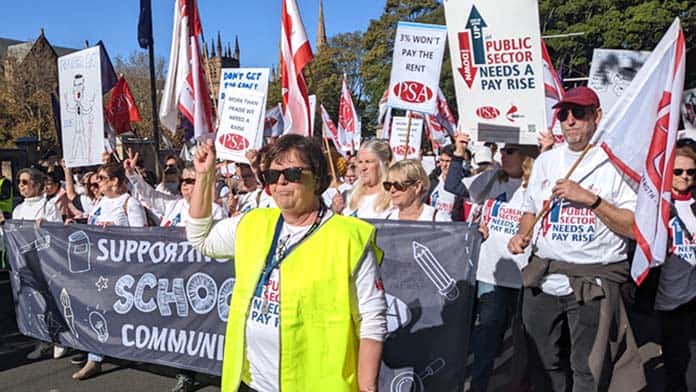Workers across the public service in NSW took strike action on Wednesday, with thousands of members of the Public Service Association (PSA) marching on state parliament.
The union is demanding that the NSW Liberal government deliver a pay rise in line with inflation and the increased cost of living. Wages in the public sector have been held down by a 2.5 per cent wage cap for the last decade.
Ahead of the strike, NSW Premier Dominic Perrottet agreed to lift the pay cap, but only to a miserly 3 per cent.
Teachers, nurses and rail workers have all staged industrial action in recent months demanding the end of the pay cap and action on crippling staff shortages.
“The wage cap needs to be removed and at the very least, our wages be in parity with increasing inflation,” Nick, who works at the Art Gallery of NSW, told Solidarity.
The PSA is demanding that Perrottet increase public sector wages by a minimum of 5.2 per cent.
Child protection workers, teacher’s aids, fisheries and health department staff, workers at art galleries, the State Library and Service NSW as well as prison guards all joined the strike.
“Frontline workers have been putting their well-being and their health at risk working through the pandemic,” Nick told Solidarity, with workers relied on to keep public services running while others stayed home.
“There’s been a higher expectation of workloads, which the public service has carried all the way through. That’s been taken for granted and now’s the time to get some respect back.”
Impossible
Like the nurses and teachers, workers across the public sector are facing impossible workloads due to lack of staff, high staff turnover, burnout and trauma for the essential work they do. An above inflation pay increase of 5.2 per cent is the bare minimum needed to address these issues and one that could easily be delivered.
The Perrottet government has tried to mute public anger with a one off $3000 payment to healthcare workers.
Closing the rally, PSA General Secretary Stewart Little told the crowd, “Health workers deserve every pay rise they get. But I also know that every person attending this rally deserves to be appreciated and respected.
“How can the Premier hand out a $3000 appreciation payment to health workers, but turn his back on every frontline worker who is here today? Mr Perrottet we have a very clear, a very loud message: we are coming for you.”
At the coming NSW state election, in March next year, we need to kick out the Perrottet government.
But we cannot solely rely on electing a Labor government to fix the public sector.
As Ray, a child protection worker from the Central Coast put it, “We definitely need the Liberals out, but I don’t know if Labor would be supporting us either. We need a very significant system change of everything because what we have right now is failing our communities in a very significant way.”
The Perrottet government is vulnerable to pressure now. Unions across the public sector need to ramp up the strike action to force them to boost pay and employ extra staff.
Public sector wide industrial action uniting nurses, teachers and the whole public sector is needed to hit the Liberal government hard.
By Niko Chlopicki






